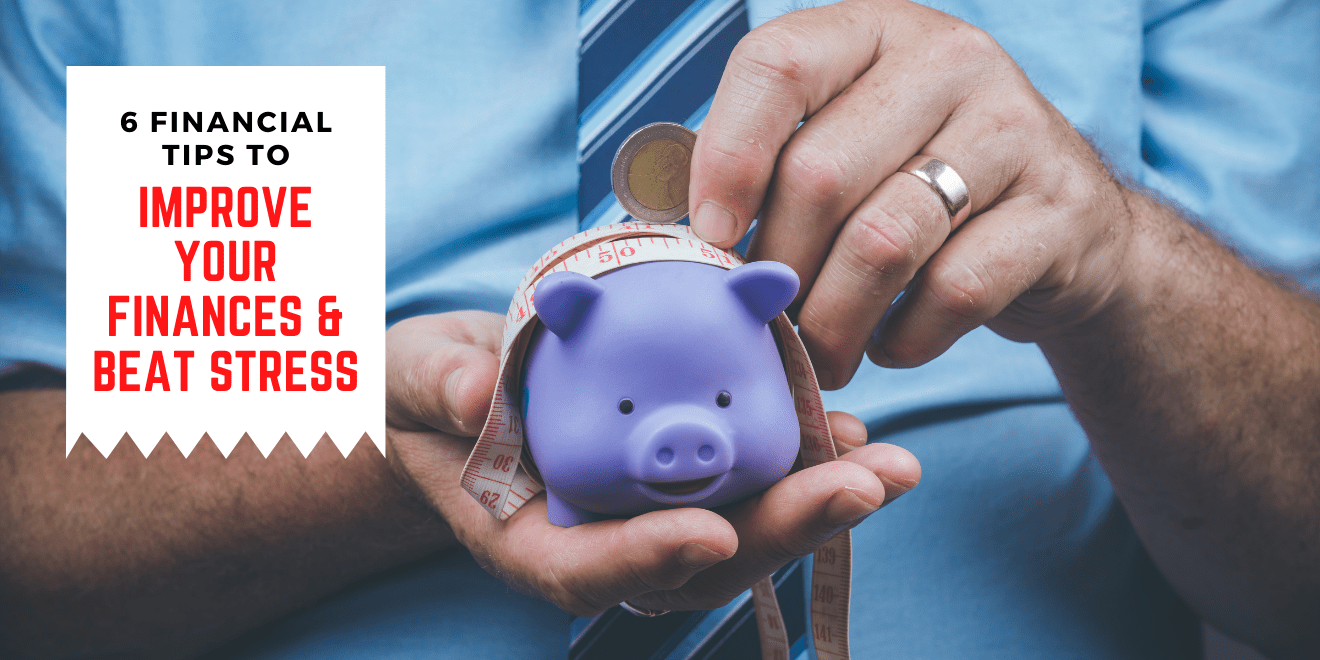6 Financial Tips That Improve Your Mental and Physical Health

Feeling a little stressed out about money? Worrying about making ends meet isn’t a good feeling, but what you might not realize is just how deeply these financial difficulties impact your mental and physical well-being.
People who are financially stressed are more likely to suffer from headaches, poor memory, and sleeping issues. The longer this stress weighs on your mind, the worse your symptoms get.
You have your fight or flight hormones to thanks for that. Cortisol and adrenaline flood your system when a situation or predator threatens you. Once the perceived threat passes, these hormone levels should return to normal.

But if you’re overworked and struggling with bills and other unexpected expenses on a daily basis, the threat never passes. To your hindbrain, it feels as though a predator is always waiting around the corner, which means your stress-response system never lets up.
Eventually, an overworked system leads to more significant health concerns , including digestive issues, heart disease, high blood pressure, weight gain, and depression.
These are serious setbacks that can have a profound impact on your qualify of life. That’s why it’s crucial you learn how to take control of your finances. Learning how to manage your money better will help you feel better in body, mind, and soul.
The 6 Ways to Improve Your Finances and Beat Stress
#1. Draw up a Budget
Managing your money without a budget is a lot like taking a hike without a map. You might be fine, but you can very easily get lost. Except when you lose track of your money, you may end up overspending in ways that hurt your financial security.

Drawing up a budget helps you visualize your responsibilities and gets you thinking about your goals. This process empowers you to control where your monthly income goes, down to the last penny. It makes sure you prioritize your cash to cover your immediate needs first while still having some money leftover to save and have fun.
#2. Make Actionable Changes
Your budget may bring some alarming issues to light. The worst of them is when you’re spending outstrips your earnings.
This isn’t always your fault because you spent your paychecks on jewelry and cars. Sometimes, it’s because your earnings haven’t kept up with your basic cost of living.
If this is the case, it’s time to figure out what you can do to change your living expenses or income.
#3. Build up an Emergency Fund
A well-balanced budget will set aside savings in an emergency fund. This account provides backup when an unexpected expense requires more cash than you have on hand.
Knowing you have this back up can come as a huge relief if any thing goes sideways. You won’t sleep if you have to take your car to the shop. You won’t have to second guess costly medical treatment when you’re sick.
#4. Use Credit Sparingly
Credit can come in handy when an emergency comes your way before you can build up an emergency fund. Sometimes, an online line of credit is a safety net that catches you before you fall on your face.
But like any financial product, a line of credit has a time and place. Most credit experts recommend using these in unexpected emergency expenses when your savings are low.

Using a line of credit to afford the fun things in life — things like vacations, clothes, and cars — isn’t a good idea. A line of credit should also never be used to make ends meet, as this can only make your money trouble worse. Every purchase you can’t afford becomes a debt you can’t repay that’s also subject to interest and fees.
#5. Talk to a Financial Advisor
If you’re relying on a line of credit to get by, it’s time you speak with a professional. There are free counseling programs available that guide you through budgeting, debt reduction, and other financial concerns. Get in touch with a financial advisor to talk about your options.
Chronic stress takes a heavy toll on the body, but it doesn’t have to be a weight you carry on your own. Reaching out can help you understand this is something millions of people with struggle with. According to a recent study , 90 percent of Americans say money impacts their stress levels. Meanwhile, 65 percent of Americans are feeling overwhelmed by financial difficulties.
Even if you don’t need an official credit counsellor, consider speaking with a therapist or a loved one. Getting your fears and worries off your chest can come as a huge relief.

#6. Seek a Physical Outlet
While you’re working hard to tighten up your finances, don’t forget to schedule a time for your fitness. A walk, Pilates class, or swimming laps — anything that helps you get your limbs moving and the blood flowing will give your mental well-being a boost.
Physical exercise releases feel-good endorphins that improve your outlook on life. And, let’s face it — regular physical activity will increase your energy and stamina so you can devote more time to things you enjoy.
Conclusion
Stress, whatever its source, puts your body through the ringer. And it’s hard to take on such an important challenge like your finances when you’re already feeling tired, withdrawn, or ill.
How can you expect your mind or body to perform at its best if it’s distracted by stress? If you’re losing sleep over your financial situation, put these tips to work. Take back control of your budget to live a happier and healthier life.




































































































